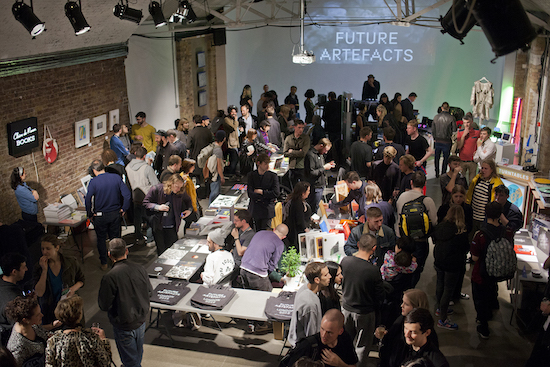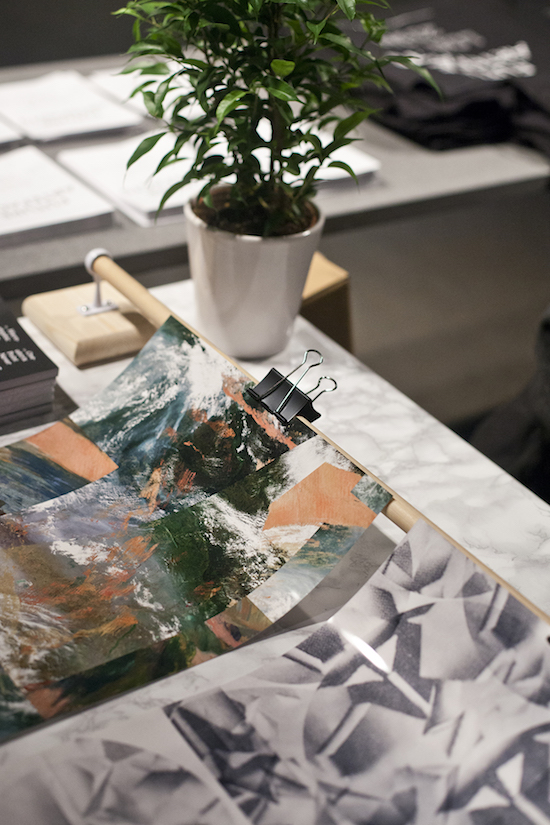All photographs courtesy of Sam Bush
Running over this weekend, the Future Artefacts fair collects together the output of forward-looking producers of physical media, be that record labels, publishers, tech companies or artists. In among them are a strong strand of Quietus favourites – Diagonal, Ninja Tune, Stolen Recordings and PAN are some of the labels showing off their wares – and there’s a parallel programme of events, music and film screenings, with Bo Ningen supported by Jupiter-C and Pumarosa at the Moth Club tonight. On Thursday, we talked to three of the participants – GOST Books, Stolen Recordings and REIFY – about the concept of an artefact, and now we’ve spoken to the founders of Future Artefacts, Ben Freeman and Deano Jo, to find out more about the event’s background.
Why did you feel the present moment was the time to celebrate people producing physical media?
Future Artefacts: It feels like we’re at the thin end of a massive curve in terms of the technological revolution, and now is a perfect time to re-evaluate the function of the physical object within the world of media.
How does the experience of receiving art in a physical way differ from digital for you?
FA: We don’t feel there’s a qualitative difference, it’s more a different type of consumption. Digital media is faster and more convenient, brightly lit and ephemeral. Physical media is generally slower to consume and has the added layer of tactility controlled by the producer of the object rather than the consistent platform of a digital viewing device.
Is there a danger of over-fetishising the kind of physical media Future Artefacts is displaying? Or is fetishising something people get too hung up about?
FA: Yes, absolutely. We’re making a very conscious effort to get away from the nostalgia of craft for craft’s sake. Everyone we chose to exhibit at Future Artefacts produces a combination of world leading content combined with thoughtful design and production. Most exhibitors produce both digital and physical products, and we are seeing people treat work as projects that exist in different ways across different platforms rather than stubbornly adhering to one type of product.

You’ve talked about cutting down on wastefulness – do environmental concerns have a bearing on your considerations of physical media?
FA: If benefits to the environment are a byproduct of people being more thoughtful about what they produce, that can’t be a bad thing. Additionally, we’re not just talking about wastefulness of material: that can apply to digital products too. It’s more a wastefulness of output in general.
In terms of a future trajectory, where would you like to see things heading? Would you like to see the production practices of small-scale labels adopted by larger independents, for instance?
FA: Yes, absolutely. We’d like to see the media industry embrace the future whilst bearing in mind the human desire for tactility and ownership. Larger labels are slower moving by nature; a label run by one person in their bedroom can adapt every day. But they set the agenda and we see it filtering through, years later.
Do you have any particular favourite artefacts being exhibited this weekend?
FA: We love REIFY‘s HEALTH totem: a 3D printed algorithm of a song that you can interact with via an app that they have developed. InOtherWords brought their new Martin Kippenberger set of playing cards with a special edition gold foil block detail on some of the cards. Ditto produced a Future Artefacts edition of Ninja Turtle Sex Museum with a black plastic cover screen printed in black, as a tribute to Viacom and U.S. Customs, both of whom took issue with the original book.

How did you go about setting up the satellite events that are running alongside?
FA: From the outset we wanted to give our audience the opportunity to experience some of the artefacts in the environments that are integral to their development. It’s great to see beyond the cassette, record or book, and be involved with the broader project. We also wanted fun, non-academic, accessible events and that became a series of club nights, live music and a panel talk hosted by Dazed.
Finally, are there any labels, publishers or manufacturers that you’d be keen to work with in the future?
FA: The space here is quite big but we were still restricted to about 40 brands. We’d love to work with some more tech companies, people who are manufacturing amazingly designed consumer audio products. Also we’d love to have more of the independents we respect, like Blackest Ever Black, Hyperdub and The Trilogy Tapes. Galleries like White Cube and the Gagosian would be great too, they make beautiful books and editions.
Future Artefacts runs until tomorrow, October 25, at Shoreditch Studios, London


